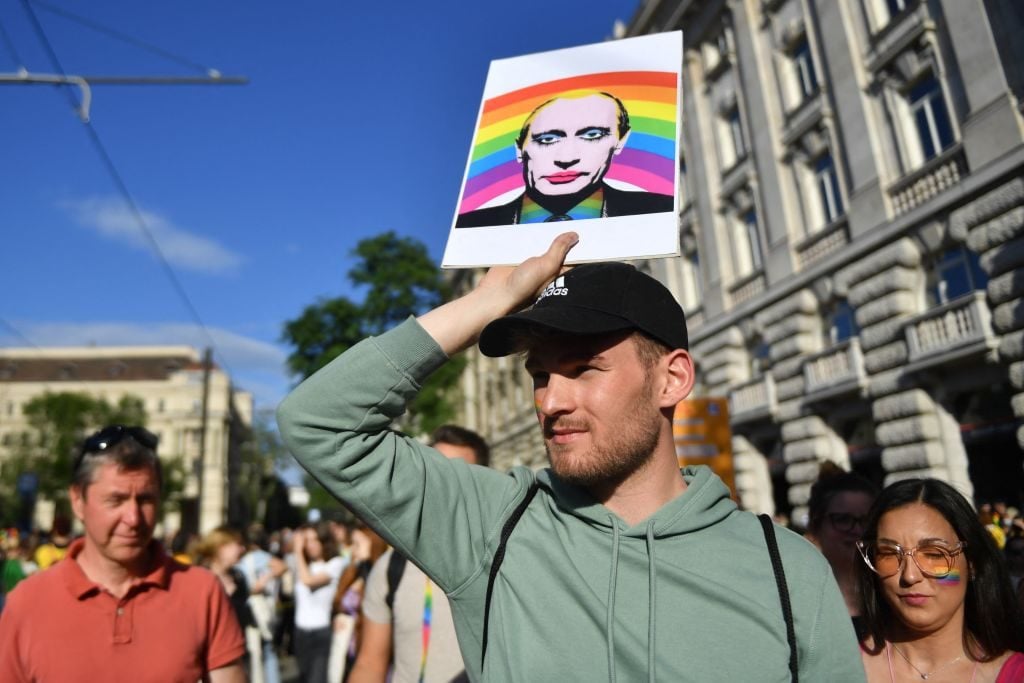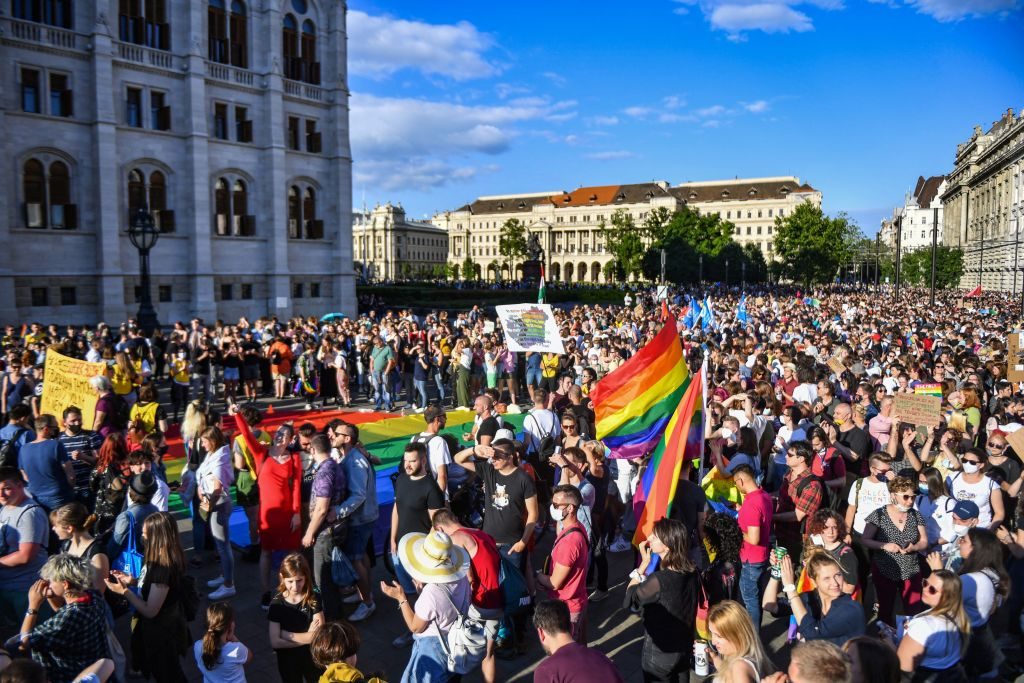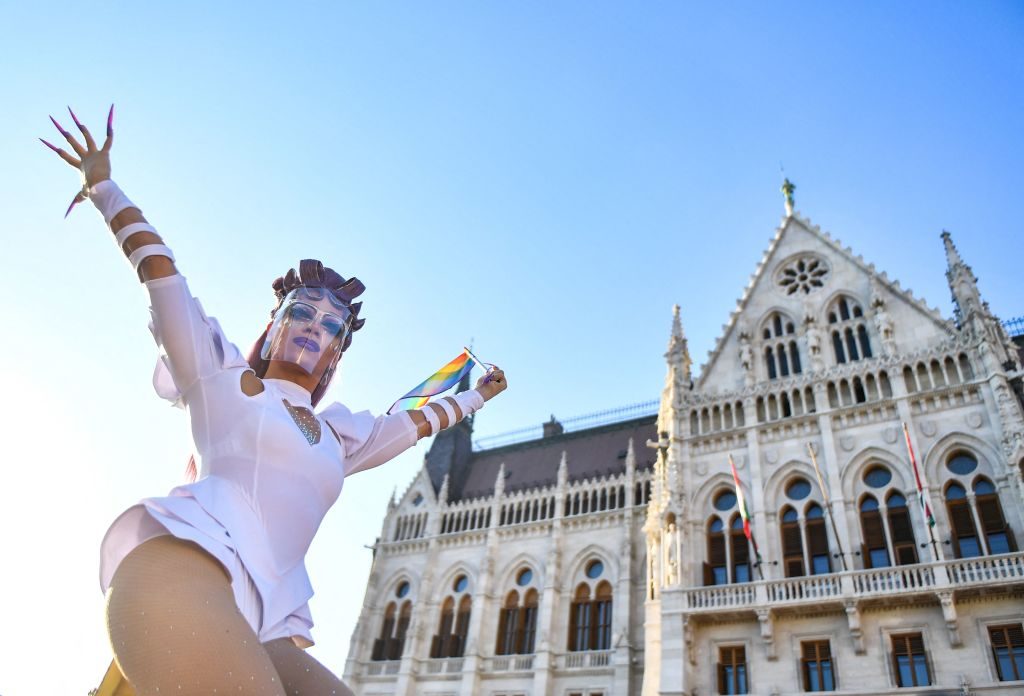Politics
Artists and Activists Are Decrying Hungary’s Sweeping New Anti-LGBTQ+ Laws as a Grave Threat to Freedom of Expression
Hungary's queer art community and human rights organizations have denounced the news.

Hungary's queer art community and human rights organizations have denounced the news.

Naomi Rea

Lawmakers in Hungary have just passed a controversial piece of legislation that has widely been condemned as discriminatory against the LGBTQ+ community. The international organization Human Rights Watch has warned that the passage of the bill will have “sweeping consequences” for artists as well as health providers, educators, and others.
The move is the latest decision from Hungary’s ruling populist party to curtail the human rights of LGBTQ+ people in the central European nation. Building on a dangerous history of packaging discriminatory laws in the name of protecting children, the bill was ostensibly designed to crack down on pedophilia by prohibiting the public sharing of content that portrays homosexuality or sex reassignment.
Hungarian prime minister Victor Orban’s Fidesz part introduced the bill, which was approved by the country’s National Assembly by a landslide yesterday, partly because most of the opposition parties boycotted the voting session.
“This law will give the government more power to clamp down on freedom of expression and more control over the cultural sector, so of course that will have an impact,” art researcher Zsuzsanna Zsuro and artist Thomas Roughan, who founded the Queer Budapest exhibition platform in 2020, told Artnet News in a joint email.

Participants gather near the parliament building in Budapest on June 14, 2021, during a demonstration against the Hungarian government’s draft bill seeking to ban the “promotion” of homosexuality and sex changes. Photo by Gergeley Besenyei/AFP via Getty Images.
“We see that queer art emerged from the underground scene only recently and this propaganda law would undermine this process,” they said. “However, the queer community has a strong and persistent voice here in Hungary so we hope this attitude continues and helps to drive away any repressive attempts form the regime.”
The artists said that the new laws will not affect the kind of art they will exhibit, although they may affect the way it is shown, as the legislation restricts the “promotion” of LGBTQ+ content to children under the age of 18.
“We remain committed to our community, the artists we work with and our belief that art has the power to educate, and we are now working to strengthen our online presence in order to keep reaching a broad range of people and ages,” the artists said. “Now, more so than ever, we feel compelled to show Hungarians and the international community the talent of LGBTQ+ creatives and the issues they face in contemporary Hungarian society.”
Queer Budapest will be holding an exhibition at London’s Hoxton 253 Gallery later this year, where they say they will have full freedom to showcase the queer talent currently flourishing in Hungary despite the harsh conditions at home.

A participant gestures and poses in front of the parliament building in Budapest on June 14, 2021, during a demonstration against the Hungarian government’s draft bill seeking to ban the “promotion” of homosexuality and sex changes. Photo by Gergeley Besenyei/AFP via Getty Images.
Orban’s party, which in the past has gained a populist mandate by positioning itself as protecting the country from perceived threats from migrants, has in recent years moved to position itself against the LGBTQ+ rights movement in order to bolster its conservative base.
On Monday, the Council of Europe’s human rights commissioner, Dunja Mijatovic, asked Hungarian lawmakers to reject the legislation. “I urge you to remain vigilant against such initiatives to push through measures that limit human rights or stigmatize against some members of society,” Mijatovic said. “This is not only an affront against the rights and identities of LGBTI persons but also curtails the freedom of expression and education of all Hungarians.”
Hungarian queer art collective Hollow Systems, which is currently working on a project called Phoenix, which explores queer themes in a performative party setting, also reacted to the news. “With the new legislation, this piece and many others become almost impossible to show in public,” they said in an email.
Asked what the international art community could do to help, they were unsure, although they said that raising awareness, and taking opportunities to platform the Hungarian queer art scene internationally, could help. Meanwhile at home, they have no intention to disappear: “We are sure we and many other artists will protest this act and continue showing works with queer topics, even though the new legal framework for such events will put an immense pressure on us.”